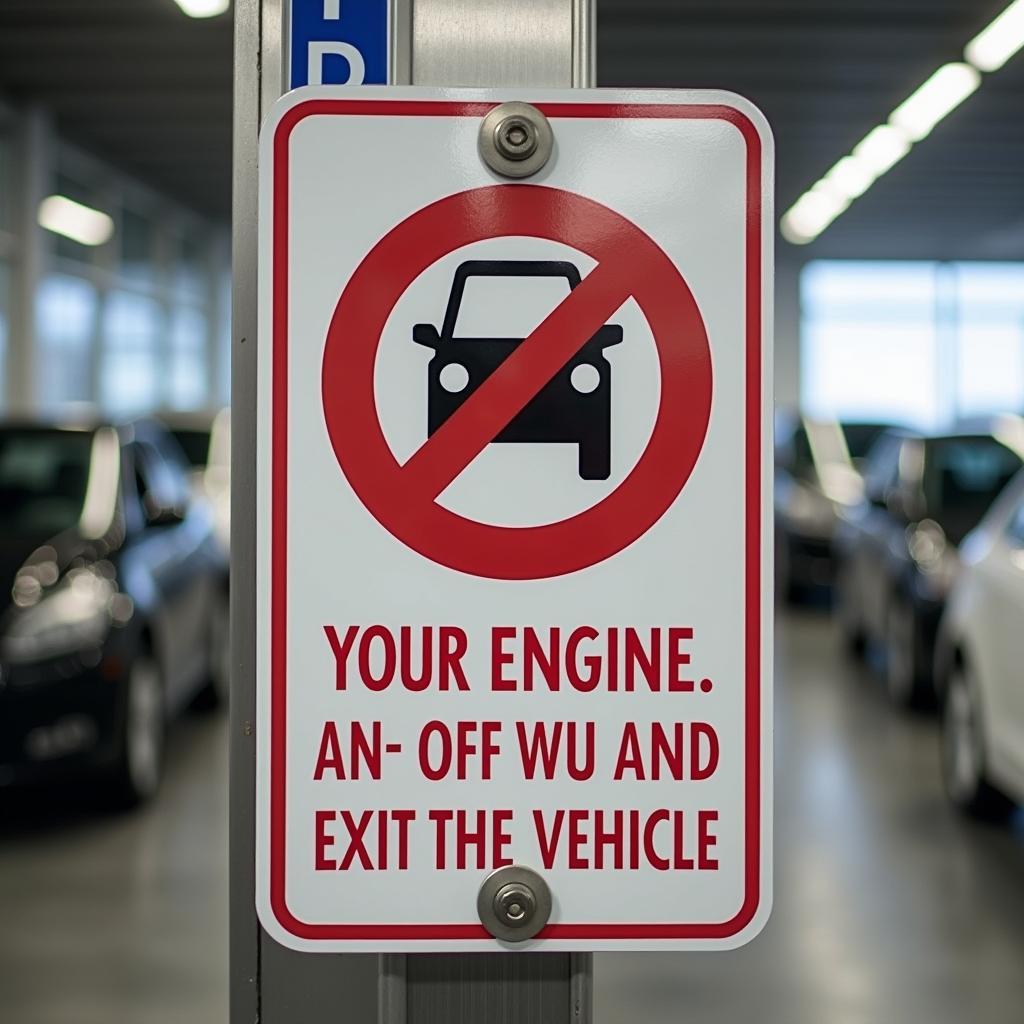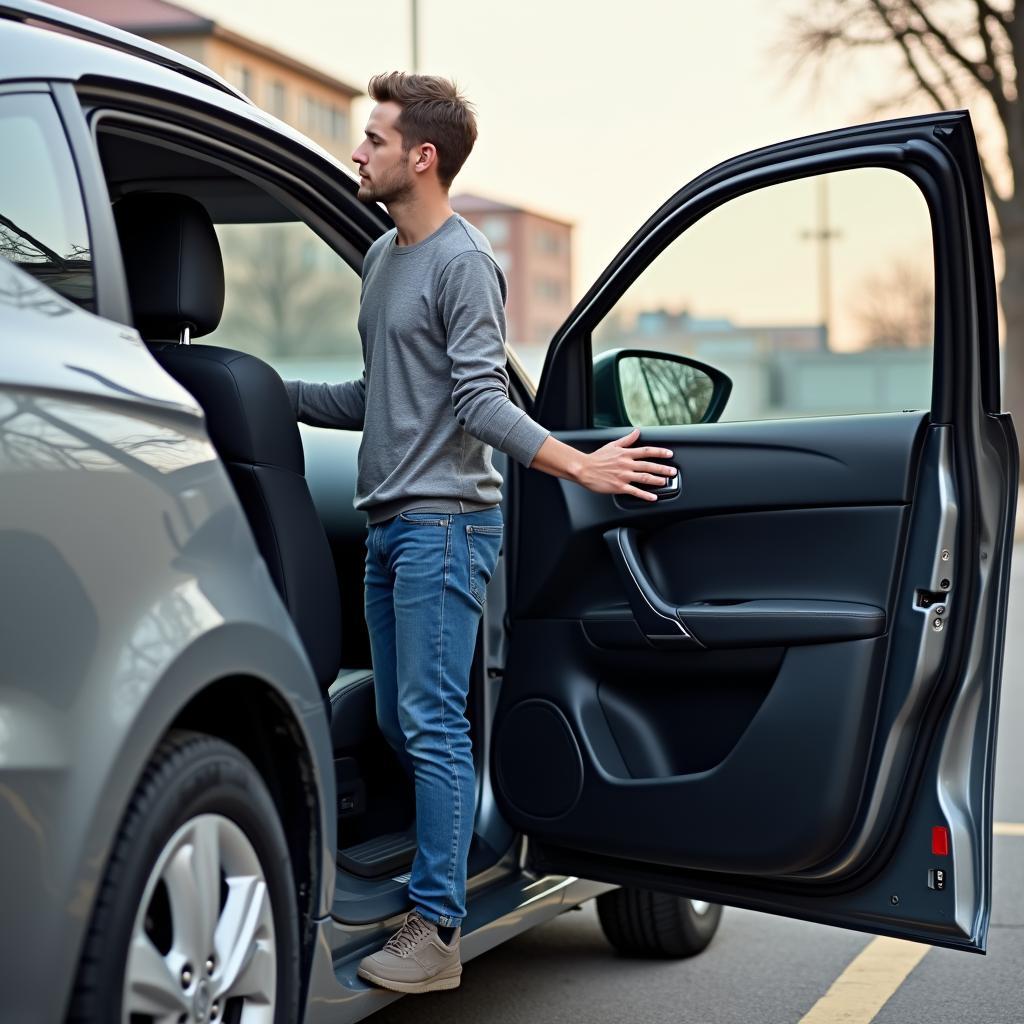
“Vui lòng tắt máy xuống xe dẫn bộ” – a phrase often heard around vehicle checkpoints or restricted areas. But how do you say this in English? Understanding the nuances of this request and how to express it clearly can be essential for travelers and those interacting with English speakers.
Understanding “Vui Lòng Tắt Máy Xuống Xe Dẫn Bộ”
This phrase essentially combines three requests: turning off the engine, exiting the vehicle, and proceeding on foot. It’s often used for security reasons, vehicle inspections, or when entering specific zones. The Vietnamese phrase emphasizes politeness with “vui lòng,” which translates to “please” in English. Therefore, capturing this respectful tone is crucial when translating.
Different Ways to Say “Vui Lòng Tắt Máy Xuống Xe Dẫn Bộ” in English
There isn’t one single perfect translation, but several options convey the meaning effectively. The best choice depends on the context and the level of formality required.
- Formal: “Please turn off your engine, exit the vehicle, and proceed on foot.” This version is clear, concise, and suitable for official settings.
- Slightly less formal: “Please switch off your engine, get out of the car, and walk.” This option is still polite but uses more everyday language.
- Informal: “Could you turn off your engine, get out, and walk, please?” This is suitable for casual situations.
- For security checkpoints: “Please kill your engine, step out of the vehicle, and follow me.” This carries a sense of authority suitable for security personnel.
- For specific instructions: “Please turn off the engine, leave your vehicle here, and walk to the designated area.” This clarifies where the person should go.
 Biển báo "Vui lòng tắt máy xuống xe dẫn bộ"
Biển báo "Vui lòng tắt máy xuống xe dẫn bộ"
Choosing the Right Phrase
The specific wording can depend on several factors:
- The situation: Are you asking someone at a border crossing, a private property, or a pedestrian zone?
- Your relationship with the person: Are you speaking to a friend, a stranger, or an authority figure?
- The desired level of politeness: Do you need to be very formal or can you use more casual language?
Example Scenarios and Phrases
At a Border Crossing
“Sir/Madam, please turn off your engine, exit the vehicle, and proceed to the immigration office.”
At a Private Property
“Please turn off your engine and leave your car here. We’ll direct you from there.”
 Tắt máy xuống xe dẫn bộ khu vực riêng
Tắt máy xuống xe dẫn bộ khu vực riêng
At a Pedestrian Zone
“Excuse me, could you turn off your engine and walk your bike through this area, please?”
In an Emergency Situation
“Turn off your engine and get out of the car immediately!”
Tips for Clear Communication
- Speak clearly and slowly, especially if the person is not a native English speaker.
- Use gestures to reinforce your instructions if necessary.
- Be patient and polite.
“Clear communication is paramount, especially when dealing with safety regulations. Using the right phrase can prevent misunderstandings and ensure smooth interactions,” says Dr. Linh Nguyen, a linguist specializing in cross-cultural communication.
Conclusion
Knowing how to say “vui lòng tắt máy xuống xe dẫn bộ” in English is essential for effective communication in various situations. By understanding the different phrasing options and choosing the most appropriate one, you can ensure clear and respectful interactions. Remember to prioritize clarity and politeness to avoid misunderstandings. “Vui lòng tắt máy xuống xe dẫn bộ” – now you can confidently communicate this request in English.
FAQ
- What does “vui lòng tắt máy xuống xe dẫn bộ” mean? It means “please turn off your engine, exit the vehicle, and proceed on foot.”
- What is the most formal way to say this in English? “Please turn off your engine, exit the vehicle, and proceed on foot.”
- Can I use more casual language? Yes, in informal situations you can use phrases like “Could you turn off your engine, get out, and walk, please?”
- What should I do if the person doesn’t understand me? Speak slowly and clearly, use gestures, and be patient.
- Why is it important to know how to say this in English? It’s essential for effective communication in various situations, particularly travel and interactions with English speakers.
- What if I need to give more specific instructions? You can add details such as “Please turn off the engine, leave your vehicle here, and walk to the designated area.”
- Is it important to be polite when making this request? Yes, politeness is always important, especially in cross-cultural communication.
Mô tả các tình huống thường gặp câu hỏi:
- Tại các trạm kiểm soát biên giới, an ninh.
- Khi vào khu vực cấm đỗ xe hoặc khu vực dành cho người đi bộ.
- Khi xe gặp sự cố cần kiểm tra.
Gợi ý các câu hỏi khác, bài viết khác có trong web:
- Các cụm từ giao tiếp tiếng Anh thông dụng khi du lịch.
- Hướng dẫn giao tiếp tiếng Anh trong các tình huống khẩn cấp.
- Từ vựng tiếng Anh về xe cộ và giao thông.